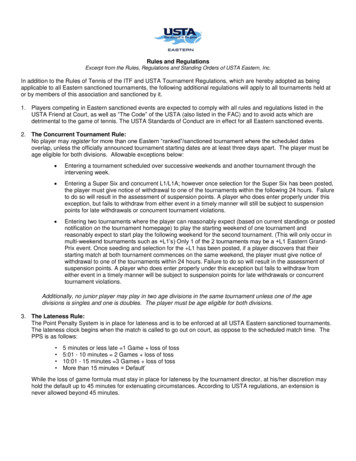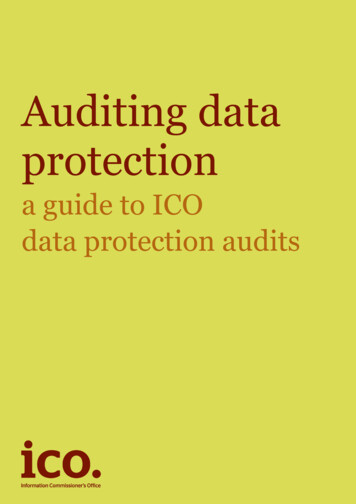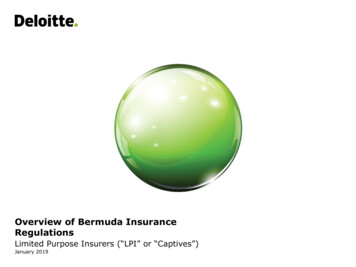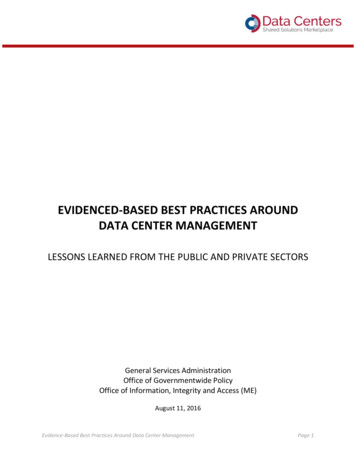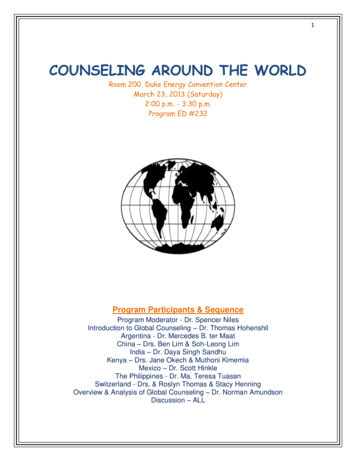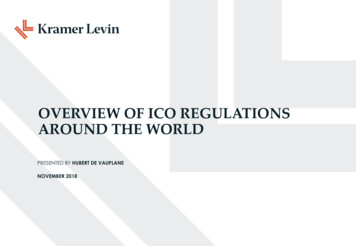
Transcription
OVERVIEW OF ICO REGULATIONSAROUND THE WORLDPRESENTED BY HUBERT DE VAUPLANENOVEMBER 2018 2017 KRAMER LEVIN NAFTALIS & FRANKEL LLP. ALL RIGHTS RESERVED.1
ICO REGULATION : GENERAL OBSERVATIONS1. Emphasis on soft lawMost jurisdictions have not yet implemented specific regulations about ICOs. Financial regulators haveoften issued guidance, which cannot be considered as binding for either courts or legislators. As aresult, analyzing the regulatory framework of ICOs often means pondering over the binding nature ofsuch guidance, which are not set in stone.2. Evolving frameworksRegulators do not have a definitive view of ICOs, blockchain technologies, or decentralized apps, andof the regulation that should apply to them. They are in the process of drafting regulations, orcontemplating to do so, with the “wait and see” attitude regulators often adopt when faced bytechnological innovations.3. Forum shopping contextToken issuers are not longstanding , well-established companies. They do not have strong links with anyjurisdiction (offices, employees) and are sometimes not even incorporated anywhere. Moreover, theyare usually providing digital services. As a result, they can be incorporated virtually anywhere aroundthe world, depending on the most advantageous regulation (including taxation). This has been takeninto account by regulators and legislators, who understand that implementing harsh frameworks(complete ban of ICOs for example) will not work as a regulatory strategy. Regulators are adapting tothe context, e.g. France is contemplating the implementation of an optional framework.2
ICO REGULATION STRATEGIESJurisdictions have opted for one of the following three solutions for ICO regulation:1. DURA LEX, SED LEX2. PRE-EXISTING FRAMEWORK3. NEW FRAMEWORKSome jurisdictions haveopted for a completeban (China).Somejurisdictionshavechosen to include tokenissuances under the existingregulatory framework of eitherfinancial instruments (USA) orpayment services (Japan).Some jurisdictions seem to becontemplatingtheimplementation of a new,specific framework for tokenissuances.Thisismostdefinitely the case in France.3
ICO AUTO-REGULATION INITIATIVES Professional associations surfaced in 2017 and started issuing documents outlining bestpractices for ICO issuers. These auto-regulations mechanisms play an essential role in harmonizing practicesaround the world and in the professionalization of all actors. The most prominent examples of such auto-regulation initiatives are :oTHE LONDON TOKEN FUNDRAISING MANIFESTOoTHE ICO CHARTERoTHE ICO GOVERNANCE FOUNDATION WHITE PAPER4
THE LONDON TOKEN FUNDRAISING MANIFESTOEthical framework: ICOS should complywith the following principles:Individual code of conduct: ICO stakeholders shouldbe:autonomy (insure that investors haveenough information to make anautonomous, informed investmentdecision),trustworthy (act honestly and fairly, put the interests ofthe customer first, protect their interests),openness (about the intendedconsequences of the token),beneficence (useful commercial or socialpurpose of the token),dutiful (act with integrity, protecting the reputation ofICOs, cryptocurrencies and DLT),lawful (observe applicable laws, regulations andprofessional conduct standards),honesty (no lies or material omissions),careful (observe standards of market integrity, goodpractices, conduct and confidentiality expectedfrom market participants),non-maleficence (reduce the impact of afailure of the token, ensure sustainability),unconflicted (manage relevant conflicts of interesteffectively),transparency (no misleading presentationof lcompetence, commit to update knowledge andskills),justice (equitable distribution of benefitsand burdens), andfairness (no party unknowingly(dis)advantaged).Questions for token issuers:does the token have a beneficialcommercial/social purpose?is it clear to everyone what yourtoken represents?dothemoneysupplyrules/algorithms align value with thetoken’s social/commercial purpose?is there a mechanism to return anyexcess or unnecessary resources?do you have the professional andtechnical resources to deliver?contained (decline to act when not competent),andaspiring (strive to uphold the highest professionalstandards).5
THE ICO CHARTERoooinformation provided by the ICO oproject:completewhitepaper;detailed presentation of the ICO; detailinfo on the team, market, product,legal entities sponsoring the project; obylaws and shareholding structure;target amount; roadmap, bios andresumes of key player; independentcheck of key players/advisorsoindependent legal review of the icotoken and its issuerwhite paper features: legal andfinancial info on the issuer, descriptionof the project, target amount, use ofproceeds, technical presentation of theproject, token structure, primary andsecondary markets, risk disclosure, owarnings, disclaimers, applicable lawand courts in the EEA.ICO smart contract code: code and osmart contracts detailing the tokendelivery processICO safety and security: ongoingpresence of an IT supervisor, ISO 27001certification recommendedKYC, anti-money laundering and anti- oterroristprocess: ID/passport, taxresidency, articles of incorporation)acceptance of a third party audit tomeasure the risk of the projectopost-ICO: disclosure of ICO process andoutcome and of markets where thetokens are traded, regular updates onthe projecttokens and cryptocurrency raisingprocess: disclosure of the types ofwallets, real time traceability ofcollected amounts, disclosure of fees in otoken paid to advisors, pre-salemecanisms and disclosure of rules tooffer discounts, traceability of all cryptotransactions, disclosure of all feescommitment on the laws of listed states:compliance with OECD guidelines ontax transparency.use of proceeds: process of restitution incase the target amount is not reached,creation of an escrow wallet, rules andconditions for the release of proceedsto the ICO project6
7
8
REGULATION IN FRANCEAs a general observation, it should be noted that French regulators seem to have adopted an overall moderatelyenthusiastic approach toward initial coin offerings.The French Financial Markets Authority (Autorité des marchés financiers or the “AMF”) issued a warning to investors on therisks related to initial coin offerings as part of its discussion paper on initial coin offerings released on 26 October 2017.However: the AMF has set up UNICORN (Universal Node to ICO’s Research & Network), a program in the framework of which it hasinitiated discussions with token issuers. Between its launch and 22 February 2018, this program has allowed the AMF todiscuss with 15 token issued out of the 21 ICOs the AMF was aware of in France. 14 of the 15 project developers that metthe AMF said they wished to conduct their operations and activities in France; in the public consultation paper from October 2017, it stated that “the tokens issued in France of which the AMF is awareshould not fall under French regulations governing the public offering of financial securities. This approach could bedifferent in the case of ICOs giving rise to the issuing of tokens granting the same or comparable rights to those grantedby financial securities (i.e. governance of financial rights).” the AMF followed up on this statement in the summary of replies to the Public Consultation on 22 February 2018, in whichit explicitly favored the creation of an optional approval regime for ICOs rather than expanding the current law toinclude ICOs since they make public offerings. It announced that “The AMF Board has therefore decided to continue towork on the definition of a possible legal framework tailored to ICOs by specifying the appropriate information andguarantees that are necessary.”9
REGULATION IN FRANCEArticle 26 draft Law on growth and transformation of enterprises (projet de loi relatif à la croissance et latransformation des entreprises) provides for a draft regulatory framework of initial token offerings.Bearing in mind that this draft will be discussed as of September 2018 in both the National Assembly andthe Senate and may therefore be amended or rejected, this law, if enacted, would grant power to theAMF to deliver an optional visa to token offerings.However, the explanatory statement introducing this draft law specifies that the AMF may only deliver thisoptional visa for tokens “which would not be governed by existing financial regulation”. As a result, thedraft article L. 552-1 of the French Monetary and Financial Code (the “MFC”) states that the proposedregulatory framework would only apply to token offerings that are not already governed by otherprovisions of the MCF, including its Book II, Title 1 on financial instruments.As a result, it is not possible to infer from recent regulatory developments (whether in the form of publicstances taken by the AMF or of the drafting of a regulatory framework) that something that the issuer selfqualify as a “token” will never qualify as a financial security and be subject to, notably, the regulations onpublic offerings of financial securities. If a digital asset issued as a token meet the criteria to qualify as afinancial security under French law, these regulations, amongst others, will most certainly apply.10
REGULATION IN FRANCEMoreover, France is contemplating the introduction of a regulatory framework for cryptoassets intermediariesUnder the proposed regulation, crypto-assets include: Tokens, as such term is defined pursuant to the aforementioned ICO regulatoryframework, i.e., intangible digital assets incorporating rights that can be issued,registered, held and transferred on a distributed ledger (dispositif d’enregistrementélectronique partagé, or DEEP, a notion introduced by the 2017 Order) and do notqualify as financial instruments Any digitally registered and transferred asset incorporating nonmonetary units of valuethat can be transferred for acquiring goods or servicesThe definition therefore encompasses not only tokens issued through ICOs but all cryptoassets, including cryptocurrencies. This broad definition of crypto-assets is similar, but notidentical, to the one introduced by Order No. 2016-1635 of Dec. 1, 2016, the purpose ofwhich was to subject crypto-asset intermediaries to AML/CF requirements.11
REGULATION IN FRANCECrypto-asset services are broadly defined to encompassservices when performed in relation with crypto-assets, i.e.:traditionalinvestment Custody of cryptographic keys for third parties Trade of crypto-assets with currency having legal tender (i.e., FIAT) trade of crypto-assets for other crypto-assets Operation of a crypto-asset trading platform Investment services for crypto-assets, i.e., receipt and transmission of orders on behalfof third parties, portfolio management on behalf of third parties, investment advice dandnonguaranteed investment12
REGULATION IN FRANCEThe proposed amendment set forth two frameworks for crypto-asset services providers: a mandatoryregistration for cryptographic keys custodians and FIAT/crypto exchanges, and an optional license for allactivities defined as crypto-asset services.Under the draft regulatory framework, the services of custody of cryptographic keys for third parties orpurchase and sale of crypto-assets for FIAT currencies will require a prior registration with the Autorité desMarchés Financiers (AMF). Before proceeding with the registration, the AMF will check the reputation andprofessional qualifications of the directors and beneficial owners. The AMF will publish the list of registeredservices provider.Other crypto-asset services providers established in France will have the opportunity to request anonmandatory license delivered by the AMF.To obtain such license, crypto-asset services providers will have to subscribe to professional liabilityinsurance (or comply with capital requirements to be set forth in the AMF General Regulations), possessresilient IT systems, and to establish adequate security procedures, policies to manage conflicts of interestsand internal audits. Once licensed, they will be required to communicate fair, clear and not misleadinginformation to their clients; inform such clients of the risks associated with crypto-assets; and publish theirfees policy.13
REGULATION IN GERMANSince 2011, the German regulator BaFin has taken the position that cryptocurrencies likeBitcoin are "accounting units" and, therefore are financial instruments, so that personsdealing in cryptocurrencies need a financial services license.On October 12, 2018 the Criminal Appeals Court in Berlin (Kammergericht) published adecision (Az .: 161 Ss 28/18) in which such position was refuted:“Trading in Bitcoin is not an offense because it is neither a unit of account nor a financialinstrument under the German Banking Act.Therefore, no permission for the operation of banking transactions is required. ”The court points out that the legislative materials indicate that Special Drawing Rights (anartificial currency made up of a basket of currencies) and similar units to express a price oramount were intended to be covered by the definition, but not virtual currencies with highvolatility.The court stresses that “Bitcoin did not exist at the time accounting units were added to thestatutory definition in 1997” and that it is not the task of courts or governmental authorities todevelop the law to regulate a new phenomenon like virtual currencies.14
REGULATION IN GERMANFor the Bafin the verdict is a defeat:“The ruling fundamentally calls into question the administrative practice of Bafin withregard to cryptocurrencies, as the postulated permission requirements as a wholedepend on the classification of cryptocurrencies as a financial instrument,”“It was not the task of the federal authorities to intervene legally in criminal laws. With thisstatement the Federal Institutio
token paid to advisors, pre-sale mecanisms and disclosure of rules to offer discounts, traceability of all crypto transactions, disclosure of all fees o use of proceeds: process of restitution in case the target amount is not reached, creation of an escrow wallet, rules and conditions for the release of proceeds to the ICO project o ICO safety and security: ongoing presence of an IT supervisor .
